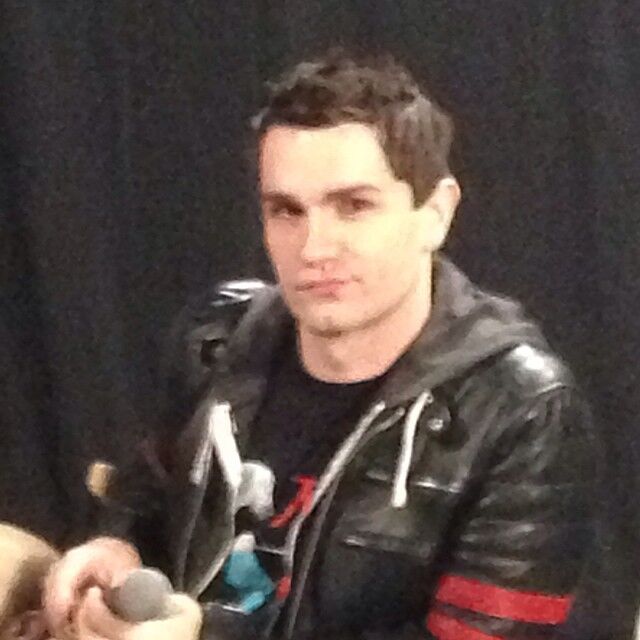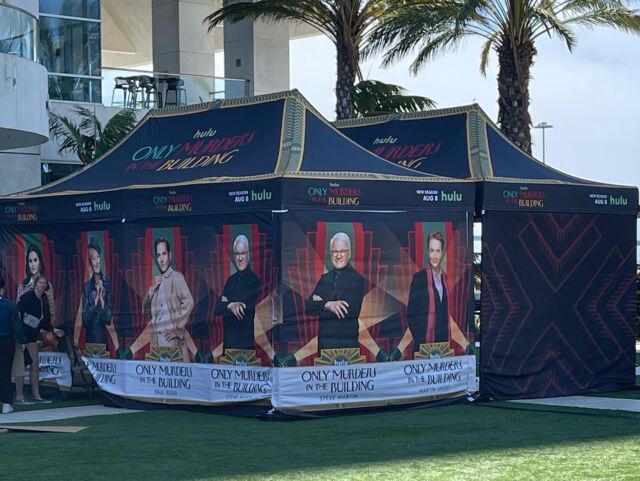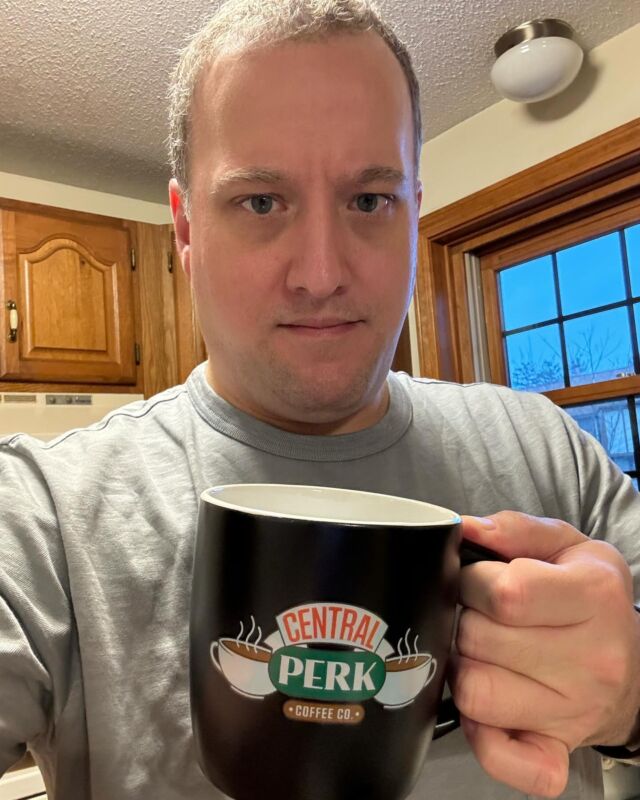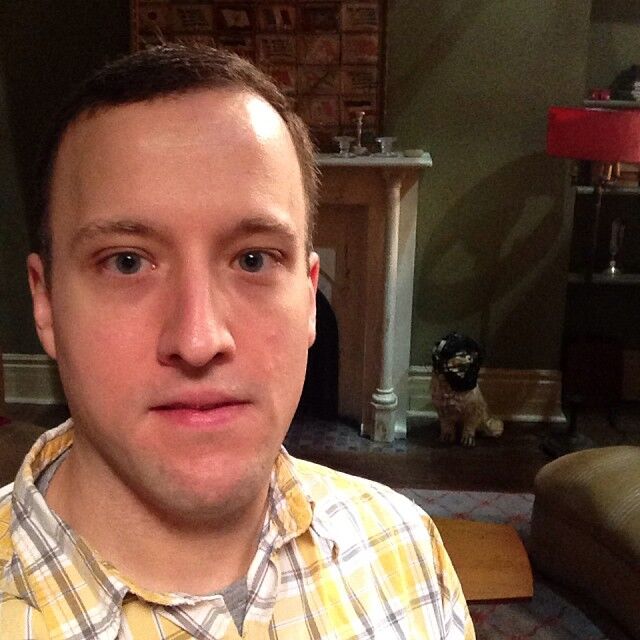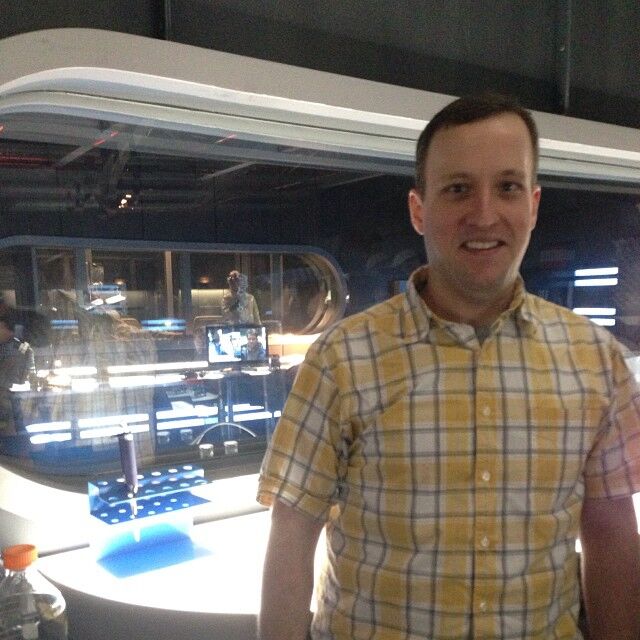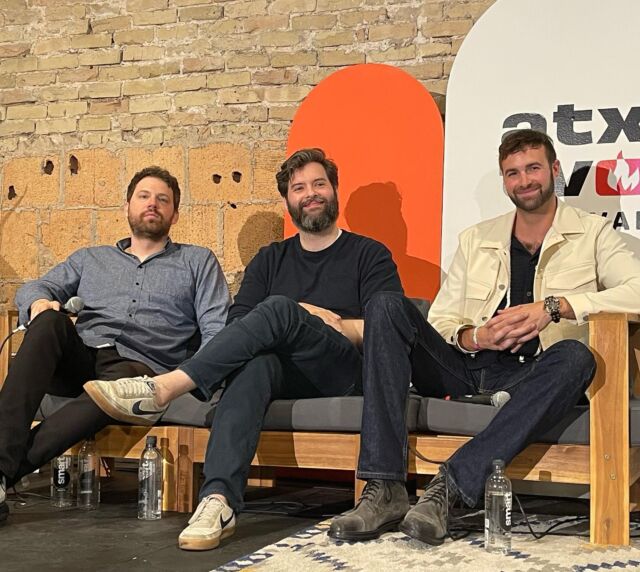 Tomorrow night at 9/8c, MasterChef finalists Christine Ha and Josh Marks will compete head-to-head in the third season finale. The winner will receive $250,000, a cookbook deal, and the title of MasterChef. Last week, I had the opportunity to participate in a conference call with the two finalists as well as Executive Producer Robin Ashbrook.
Tomorrow night at 9/8c, MasterChef finalists Christine Ha and Josh Marks will compete head-to-head in the third season finale. The winner will receive $250,000, a cookbook deal, and the title of MasterChef. Last week, I had the opportunity to participate in a conference call with the two finalists as well as Executive Producer Robin Ashbrook.
K. Nolan: Christine and Josh, was there a turning point in the competition when you said to yourself that you thought you could actually win the whole thing?
C. Ha: Josh, you go first.
J. Marks: Combined with being able to see my surroundings and how the other chefs are competing and the quality of food that they’re putting out, I said, hey, I know I can smoke these guys.
C. Ha: I think for me making it this far, I think just being in Top Five, I thought, wow, the chances are one in five; and then getting to Top Three, I said I would rather go home as third than second place. So if I’m going to get into Top Two, then hopefully I go all the way.
K. Nolan Which of the judges did you guys find the most nerve-wracking to stand before?
J. Marks: I’m going to go first on that one. I have to say it’s Chef Gordon because he’s usually the most critical, and he usually has the best advice, because I feel like he’s the best chef there, so I want to do everything I can to impress him. I feel like if I can get Gordon to my side, then the rest will kind of understand, considering his level of expertise.
C. Ha: I would say for me it was Joe Bastianich, because he is very critical and the most intimidating out of the three.
And here’s what else was asked during the call:
Hey, Joshua, they always say you’re seven foot, and I don’t know if they rounded that off or not. Are you exactly seven foot?
J. Marks: About 6’11 3/4” if you wanted to get technical.
There’s a lot of guys like Brad Garrett who will tell you that when they’re really tall, everybody just expects them to play basketball and do things like that, even if that’s not what they wanted to do. What about you, did you play basketball as a kid, or did you always know that cooking was your passion?
J. Marks: I played basketball growing up and I still play ball now. I always liked basketball. I love basketball, but I started seeing this passion for food come and you got to eat every day, so I just kept cooking and cooking and cooking and food just took the top spot.
And did you play college ball?
J. Marks: I played for Tupelo College down in Jackson, Mississippi and two years. We went from worst to first and we won the first ever school championship.
How old were you when you really discovered a passion for cooking?
J. Marks: I was probably about 21 when I first got into my first apartment, and I started realizing once I started cooking, I realized I’m pretty good at this.
How much time do you have between each of the cooking competitions, and how many days have you been competing all told?
R. Ashbrook: Hello, it’s Robin here, the showrunner and executive producer. It’s a good question. I’ll give you the headline, and then I’m sure you’re more interested in Josh and Christine’s answer; but the headline is it’s a long time for especially for the finalists in the MasterChef competition and production. We probably spend about the best part of eleven weeks together, and we shoot on about a six day basis, so these guys really go through it and every single day there’s a new challenge and new test for them.
It’s quite relentless, so the finale is always as emotional as it is in our search for the winner, of them kind of crossing the finish line of which they both finally get back released into the real world. But it’s a full-on schedule, and I would also say our judges; Gordon, Graham and Joe, they are there every single day as well. They roll on exactly the same schedule, because they are committed as I am and as all of the contestants are.
But if that’s not good enough and you want more specifics from their eyes, then I’ll throw you over to Josh and Christine.
J. Marks: To add to what Robin said, we talk about the TV land aspect of it, the one day aspect, can I talk about that?
R. Ashbrook: Yes, in the sense of that every day there’s a different challenge that you guys face, yes.
J. Marks: Right, well, I mean like you say, we cook every single day except Sunday. On Sunday we either have free time in the kitchen or in a cooking class.
Josh and Christine, how difficult was that final challenge?
 C. Ha: I would say that it’s obviously going to be the biggest challenge that we’ve had in our lives. It’s the last finale. It’s to win the whole thing, and it’s just us ourselves cooking three courses, so nerve-wracking and probably the most anxiety inducing challenge for myself.
C. Ha: I would say that it’s obviously going to be the biggest challenge that we’ve had in our lives. It’s the last finale. It’s to win the whole thing, and it’s just us ourselves cooking three courses, so nerve-wracking and probably the most anxiety inducing challenge for myself.
J. Marks: It was most definitely the hottest day in the kitchen. I was sweating like crazy. It was so intense. The best part about it is throughout the challenge, we had some of the best equipment and stuff to work with, but for the finale, they really brought out the best equipment, so we had the best mixers. We had ice cream makers. We had the best knives, everything you need. So besides the fact that it was super hot, the cooking situation was great.
What motivated each of you to try out for the show?
C. Ha: I think for myself, I’m the kind of person that welcomes all sorts of challenges. I think I’ve gone through a lot of obstacles in life, and it’s always about challenging myself and pushing myself to see how far I could go. So I think I just wanted to take it on and see how far I could go.
J. Marks: I’m definitely a competitor coming from an athletic background, I play to win. Competitions like this, and especially with something that’s so passion-driven like food and cooking, that’s when I really want to do my best, so that was the edge that I have during the competition.
Josh, you mentioned a cooking class. Can you elaborate a little bit more on that?
J. Marks: The cooking class is like, so MasterChef, they really teach you how to be a chef. You’re not just on there cooking all willy nilly, so they’re teaching us baking component classes, where they teach us how to make pastry cream, sponge cake, cobbler, shortbread and pie crusts, etc. But they don’t necessarily show us how to assemble an apple pie and make a pie, but they show us how to make the crust. You know what I’m saying?
Yes, and what kind of recipes do you have access to during the competitions themselves?
R. Ashbrook: There is a full library that the guys have access to. In fact, it’s on the set, so it’s there in the lounge area, there’s a full library of pretty much every cookbook in the world and then behind the scenes, especially when we start with 18, there are 18 versions of every single cookbook. So everybody has the same.
The great thing about the show, as you know, Rene, because you know so much about us, is everyone has access to the same ingredients during every challenge. In the same way, they all have the same access to the same learning support, so behind the scenes there are millions of copies of every single cooking book. In their free time, they’re absolutely allowed to go away and read those as most of them do and sit and read all night.
Obviously we have a culinary team that supports us all the way through, and indeed you may have met them. They are there, they never give advice during challenges, but as Josh said, as they move on through, there are some of the basics that they get taught, but obviously never ‘this is what you will be making and this is how we make it.’ So there’s a support network there that is kind of indicative of the whole way that we view the whole process for these home cooks throughout.
Do you think the average viewer at home understands that, because it’s kind of presented as these are the best home cooks in America. But if you have a cookbook next to you, I’m not sure that the average viewer at home understands that. Like because the souffle challenge, for example, I think one of the things people are like how in the world could you know how to do all that?
R. Ashbrook: Those cookbooks they can’t roll over and use those recipe books in the midst of a challenge. We obviously monitor all of that. I am nowhere near the skill level of Josh and Christine, so you could give me every cookbook in the world, and I’m not going to nail what these guys did. So I imagine most viewers probably accept that, you know.
J. Marks: But to answer your question more directly, like during the challenge, no way in heck you got a recipe in our hand or pocket or anything. It’s all from experience or it’s winging it.
C. Ha: I would have to add that it’s up to us in our free time, which is very limited, we choose to study or not, because there is that resource library. But you just have to know it already or try to study and commit certain recipes to memory, but we don’t go into the challenges knowing at all what’s going to be cooked.
One of the great things about MasterChef is that we get to see this sort of softer, more encouraging side of Gordon Ramsay. He seems to have taken a shine to you, Christine, and deservedly so, but do you think he played favorites with you at all?
C. Ha: I don’t feel like it, because there have definitely been times when Chef Ramsay would tell me that my food didn’t taste good at all, or he’s cursed at me before in the kitchen, so I don’t feel like he was playing favorites.
Josh, can you define your cooking style for us?
J. Marks: Well, I’m definitely not a down home southern cook. I’m very eclectic, so on any give day you might see some southern food. You might see Southern food, but you also might see some unexpected ingredients, like Indian, Thai, or Caribbean, that you wouldn’t see from someone living in the South.
Christine, throughout the competition competing with your disability, you’ve been an inspiration to not just your fellow contestants, but the judges and people watching at home. You have to be really proud of yourself, but it also must be a lot of pressure. Has it made it more difficult than it already was having people putting you on a pedestal and looking at you like that?
 C. Ha: That’s actually a really great question, because I do feel like those sometimes are my sentiments exactly. I think the higher people put me on a pedestal, I think obviously the longer the height I have to fall. So it’s a little bit scary being such a role model.
C. Ha: That’s actually a really great question, because I do feel like those sometimes are my sentiments exactly. I think the higher people put me on a pedestal, I think obviously the longer the height I have to fall. So it’s a little bit scary being such a role model.
When I meet people in the street who come up to me and tell me that I’ve been an inspiration, I really am just myself, and I just want people to know that I’m human and nobody is perfect. I am who I am and so I think that’s important to me that I’m really myself, and I keep that integrity. Because it’s great to be an inspiration, but I think at the same time, I try to keep it real. But I do think that people appreciate that as well, that side of me that I’m honest and I try to be as authentic as possible.
J. Marks: Just to add to that, Christine definitely does keep it real.
C. Ha: Thanks.
You also seem to be one of the most supportive cooks in the kitchen this season. It’s been rare to hear you say anything negative about your fellow contestants so far. And you are often wearing a huge smile when other people succeed at the judges’ table. What mindset do you have to be in to be so benevolent and still win?
C. Ha: I think because I really try my very best to see the positive and the best in everybody, so I really am truly happy when somebody else does well in a challenge. I believe to foster such a true competitive environment I think people should win when they’re at the top of their game, not because someone else is at the bottom of their game. So I think in a competition like this, may the best cook win, and I think to be fair it’s about skill level. I care about everyone on the show. I have no ill will towards any of the other contestants, so I think that’s just my nature that I really just want everyone to do the best.
What was the one ingredient that you were hoping not to see in a mystery box?
J. Marks: Oh, tofu, I was saying the whole season, I’m like, Lord, please don’t let it be tofu or vegetarian, because I’m screwed.
C. Ha: I know that’s what is hilarious because there’s several times when we were asked what we’re hoping to see in the mystery box, and I kept saying tofu, because I knew Josh wouldn’t it want it to be tofu. I can cook with tofu, so it’s funny that that’s what I kept saying I wanted. But I think for me I don’t know. I guess—
Atlantic crab?
C. Ha: No, I mean I think like I would welcome all sorts of those things, but I think like something I don’t know that’s really crazy out of the box like horsemeat like they eat in Japan. I think wouldn’t know what to do with that, so that’s probably something I would hope that I wouldn’t see in a mystery box.
Josh, you were eliminated from the show. What is it like to now be in the top two?
J. Marks: It just feels right, because my elimination to me I felt like it was the bad situation, but I feel like I proved myself leading up to my elimination, and even after my elimination, I deserved to be there no matter what anybody says.
What was it like getting that phone call that you could possibly be back on the show?
J. Marks: Well, I didn’t know I was coming back to compete. I thought I was coming back to cheer. They said we were coming for some press and media stuff, so I was under the impression that I wasn’t competing anymore.










